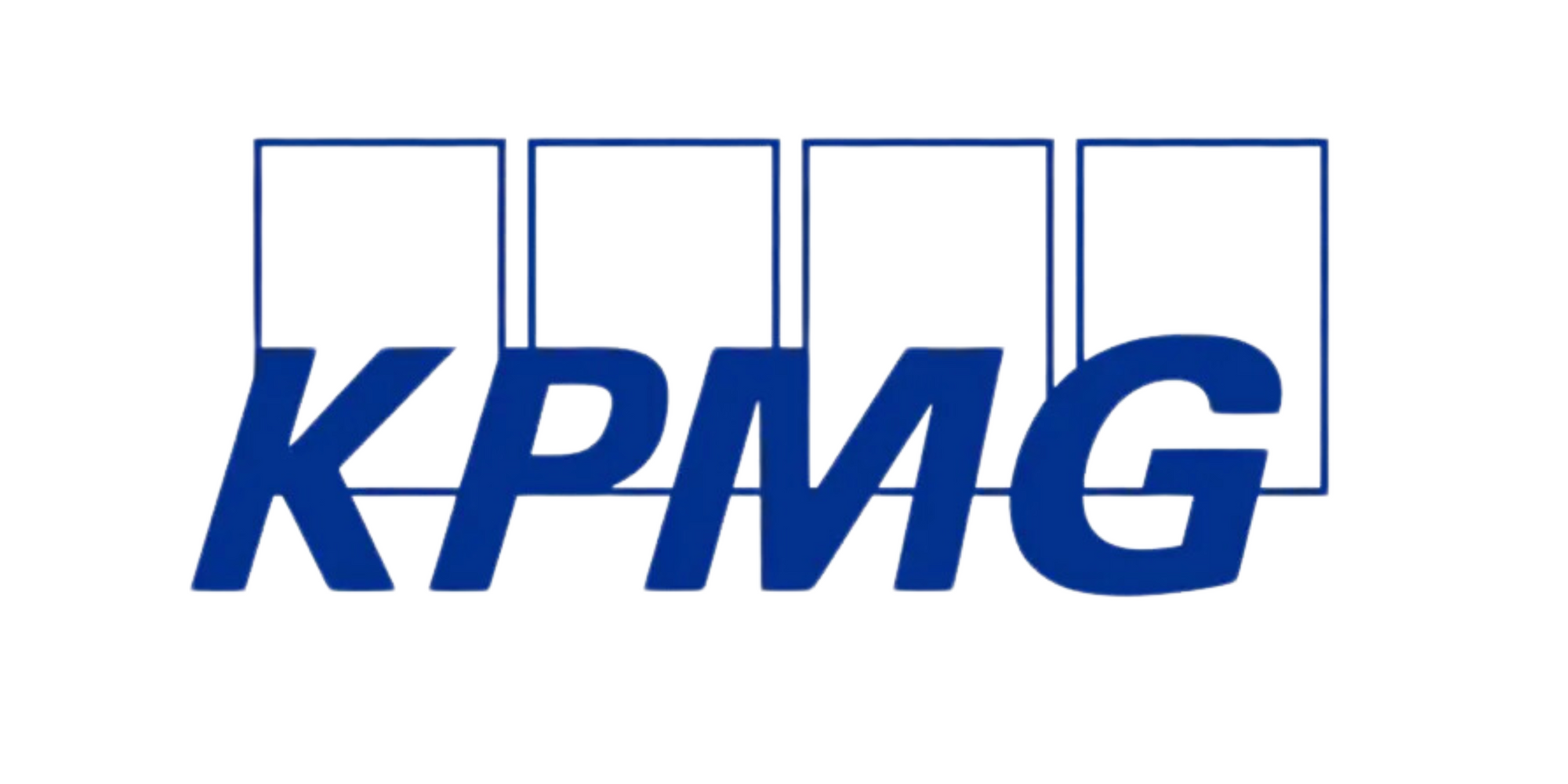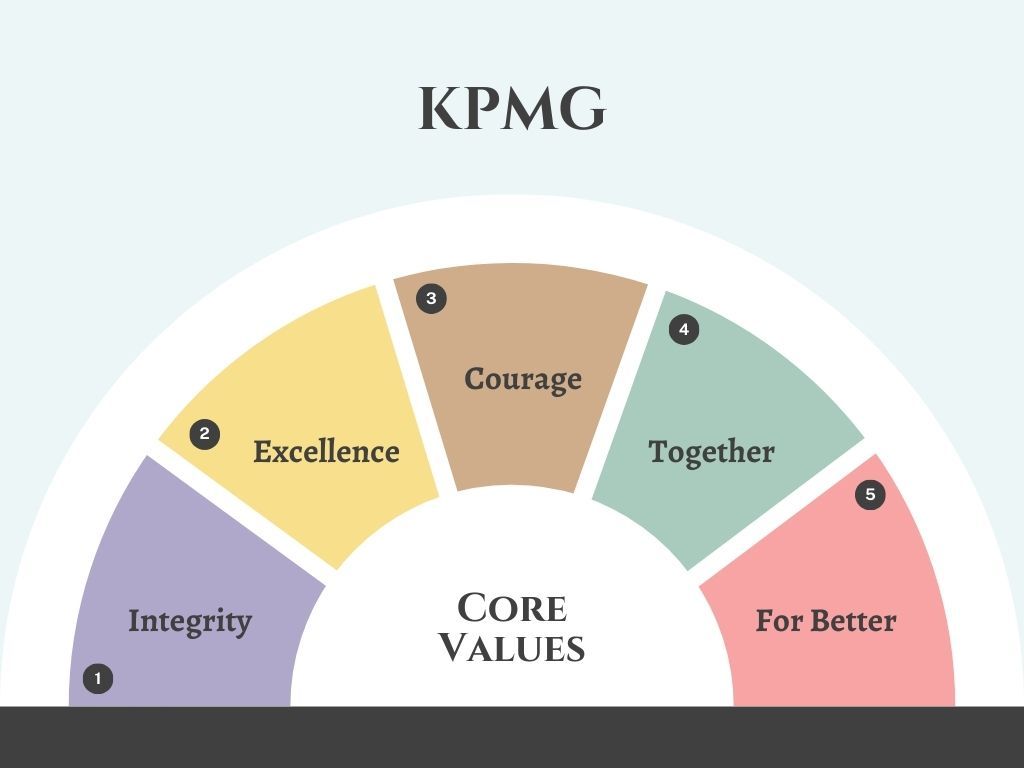

KPMG is one of the largest global networks of professional services firms, providing audit, tax, and advisory services. Established in 1818, it operates in 143 countries with over 270,000 employees. KPMG's structure consists of independent member firms, each responsible for their own operations, while KPMG International provides support services. The firm generated $36 billion in revenue in 2023, with significant contributions from its audit, advisory, and tax services. KPMG emphasizes integrity, excellence, and collaboration as core values, aiming to inspire confidence and empower change in the communities it serves.
This blog is designed to provide aspiring candidates with a comprehensive overview of KPMG, covering its history, culture, services, and career opportunities, to help you prepare effectively for interviews and embark on a successful career with this esteemed institution.
1. Overview of KPMG
About
| Attribute | Details |
|---|---|
| Founders | William Barclay Peat, James Marwick, Roger Mitchell, Piet Klijnveld, Jaap Kraayenhof, Reinhard Goerdler, Thompson McLintock, Frank Wilber Main |
| Industry Type | Professional Services |
| Founded | 1987 |
| Headquarters | London, England |
History
Early Years (1870 - 1911)
- 1870: William Barclay Peat founded his accounting firm, William Barclay Peat & Co., in London.
- 1897: James Marwick and Roger Mitchell established Marwick, Mitchell & Co. in New York City.
- 1911: The firms of William Barclay Peat & Co. and Marwick, Mitchell & Co. merged to form Peat Marwick International (PMI), creating a global network of accounting firms.
Formation of KPMG (1979 - 1987)
- 1979: Piet Klynveld's firm, Klynveld Kraayenhof & Co., merged with Deutsche Treuhand-Gesellschaft and McLintock Main Lafrentz to create Klynveld Main Goerdeler (KMG).
- 1986: KMG and Peat Marwick International agreed to merge.
- 1987: The official merger of PMI and KMG took place, forming KPMG, which stands for Klynveld, Peat, Marwick, and Goerdeler.
Expansion and Development (1988 - 2000)
- 1990: KPMG began expanding into Eastern Europe following the fall of the Berlin Wall.
- 1993: KPMG Peat Marwick and Deutsche Treuhand-Gesellschaft merged, further solidifying KPMG's presence in Europe.
- 1998: KPMG established its new head office in Germany, enhancing its operational capabilities.
Modern Era (2001 - 2024)
- 2001: KPMG spun off its U.S. consulting firm through an IPO, rebranding it as BearingPoint.
- 2002: KPMG separated its consulting business from its auditing services, leading to the sale of KPMG Consulting, Inc.
- 2003: KPMG divested its legal arm, Klegal, and sold its Dispute Advisory Services to FTI Consulting.
- 2007: KPMG's member firms in the UK, Germany, Switzerland, and Liechtenstein merged to form KPMG Europe LLP.
- 2015: KPMG celebrated its 125th anniversary and launched various initiatives to enhance its global service offerings.
- 2015: KPMG IT Service was established following the acquisition of cloudpartner.de.
- 2020: KPMG International Limited was incorporated in London, transitioning from a Swiss Verein to a limited company.
- 2021: KPMG UK appointed its first female leaders, Bina Mehta and Mary O'Connor, amidst leadership changes.
- 2021: KPMG UK revised its partnership process and faced potential fines related to the Carillion lawsuit.
- 2022: KPMG announced plans to acquire 50% of UK-based venture capital advisory firm Acceleris.
- 2022: Plans were made to downsize its office footprint in New York City by 2025.
- 2023: KPMG reported $36 billion in revenue, reflecting growth across its audit, advisory, and tax services.
- 2024: KPMG partners approved the merger of its UK and Switzerland firms, enhancing their service capabilities and generating $4.4 billion annually.
Key Milestones in KPMG's History
2. Company Culture
Purpose, Vision, and Values
KPMG aims to inspire confidence in their people, clients, and society, helping to empower the change needed to solve challenges and lead the way forward.
KPMG's vision is to be the clear choice for clients, defined by the quality of their services and the relationships they build.

KPMG's core values are:
- Integrity: We do what is right.
- Excellence: We never stop learning and improving.
- Courage: We think and act boldly.
- Together: We respect each other and draw strength from our differences.
- For Better: We do what matters.
3. Comprehensive Product and Service Offerings at KPMG
KPMG offers a comprehensive range of products and services across various sectors, focusing on audit, tax, and advisory services. Here’s an overview of their key offerings:
1. Audit & Assurance
KPMG provides a range of audit and assurance services designed to enhance the reliability of financial reporting and improve business performance:
- Financial Statement Audits: Independent audits of financial statements to ensure compliance with accounting standards.
- Internal Audit Services: Support in evaluating and improving internal controls and risk management processes.
- Sustainability Assurance: Verification of sustainability reports and disclosures, ensuring transparency in environmental, social, and governance (ESG) practices.
- Regulatory Compliance: Assistance in meeting regulatory requirements and standards.
2. Tax & Legal
KPMG offers comprehensive tax and legal services to help organizations navigate complex tax environments:
- Corporate Tax Advisory: Strategic tax planning and compliance services to optimize tax positions.
- Transfer Pricing: Development of transfer pricing policies and documentation to comply with international regulations.
- Indirect Tax Services: Guidance on VAT, sales tax, and other indirect taxes.
- Employment Tax Services: Support in managing employment-related tax obligations and compliance.
- Legal Services: Assistance with corporate law, mergers and acquisitions, and contract management.
3. Advisory
KPMG's advisory services focus on helping organizations improve their performance and manage risks:
- Management Consulting: Strategic planning, operational improvement, and organizational change management.
- Risk Management: Identifying and mitigating risks across various domains, including financial, operational, and compliance risks.
- Deal Advisory: Support throughout the transaction lifecycle, including due diligence, valuation, and post-merger integration.
- Technology Advisory: Guidance on digital transformation, IT strategy, and technology implementation.
4. Private Enterprise
KPMG provides tailored services for private enterprises, focusing on growth and sustainability:
- Business Strategy and Planning: Assistance with strategic planning, market entry, and growth strategies.
- Succession Planning: Support for family businesses in preparing for ownership transitions.
- Financial Management: Advisory on financial reporting, budgeting, and forecasting.
5. ESG (Environmental, Social, and Governance)
KPMG helps organizations integrate ESG considerations into their business strategies:
- Sustainability Consulting: Guidance on sustainability practices, reporting, and compliance with ESG regulations.
- Impact Measurement: Tools and methodologies to measure and report on social and environmental impact.
- ESG Risk Management: Identifying and managing risks related to environmental and social factors.
6. AI (Artificial Intelligence)
KPMG leverages AI to enhance business processes and decision-making:
- AI Strategy and Implementation: Developing AI strategies and implementing AI solutions to drive efficiency.
- Data Analytics: Utilizing AI and machine learning to analyze data for insights and predictive analytics.
- Automation Services: Implementing robotic process automation (RPA) to streamline operations.
4. Financial Performance and Market Position
KPMG's financial performance and market position can be summarized based on their recent revenue reports and performance indicators:
Financial Performance
- Fiscal Year 2023 Revenue: KPMG reported global revenues of $36 billion for the fiscal year ending September 30, 2023, marking an 8% increase in local currency and a 5% increase in U.S. dollars compared to the previous year.
- Revenue Growth by Service Line:
- Audit Services: Grew by 9%, driven by a strong focus on audit quality and significant investments in talent and technology.
- Advisory Services: Increased by 7%, benefiting from investments in technology and strategic alliances.
- Tax & Legal Services: Experienced a 10% growth, fueled by tax transformation initiatives and evolving client needs in ESG (Environmental, Social, and Governance) areas.
Market Position
- KPMG Financial Performance Index (FPI): KPMG's FPI measures the financial health of companies globally. As of Q3 2023, the global average FPI score was 90.01, indicating a slight decline from the previous quarter. This index helps assess the relative strength and health of key markets and sectors, providing insights into financial performance trends.
- Investment Strategy: KPMG has committed to investing $4.2 billion by 2026 in technology, talent, and ESG initiatives as part of its Collective Strategy. This investment aims to enhance service delivery and maintain competitive advantages in the market.
- Employee Growth: KPMG's global headcount increased by 3% to over 273,000 employees, reflecting their commitment to attracting and retaining top talent.
5. Key Competitors
Competitors of KPMG
KPMG operates in a competitive landscape with several key players in the professional services sector. Here are the top five competitors, along with an overview of each, their services, and their market position:
1. Deloitte
- Overview: Deloitte is one of the largest professional services networks in the world, providing audit, consulting, financial advisory, risk management, and tax services.
- Services: Deloitte offers a wide range of services, including audit and assurance, consulting (strategy and operations, human capital, technology), risk advisory, financial advisory, and tax services.
- Market Position: Deloitte is consistently ranked as the largest of the Big Four accounting firms by revenue, reporting approximately $59 billion in global revenue for FY2023. Their extensive service offerings and strong brand recognition position them as a leader in the industry.
2. PwC (PricewaterhouseCoopers)
- Overview: PwC is a global network of firms delivering services in audit and assurance, consulting, and tax. It is known for its commitment to quality and innovation.
- Services: PwC's services include audit and assurance, consulting (management, technology, and risk consulting), and tax services, along with specialized services in areas like digital transformation and sustainability.
- Market Position: PwC reported global revenues of approximately $50 billion in FY2023, making it one of the largest professional services firms. It is recognized for its strong client relationships and extensive industry expertise.
3. EY (Ernst & Young)
- Overview: EY is a multinational professional services firm providing assurance, tax, transaction, and advisory services. It focuses on building a better working world.
- Services: EY offers services in audit and assurance, tax, advisory (including strategy and transactions), and consulting, with a strong emphasis on digital transformation and innovation.
- Market Position: EY generated around $45 billion in global revenue in FY2023. The firm is known for its strong focus on technology and innovation, particularly in areas like artificial intelligence and blockchain.
4. BDO
- Overview: BDO is a global network of public accounting firms providing audit, tax, and advisory services. It is known for its personalized service and industry expertise.
- Services: BDO offers audit and assurance, tax services, advisory (including business consulting and risk management), and specialized services for various industries.
- Market Position: BDO reported global revenues of approximately $12 billion in FY2023, positioning it as a significant player in the accounting industry, especially among mid-market clients.
5. Grant Thornton
- Overview: Grant Thornton is a global accounting organization providing a range of services to dynamic organizations, including audit, tax, and advisory services.
- Services: Grant Thornton's offerings include audit and assurance, tax services, advisory (including business consulting and risk management), and specialized services for sectors like healthcare and manufacturing.
- Market Position: Grant Thornton reported global revenues of around $6 billion in FY2023. The firm is recognized for its client-focused approach and strong presence in the mid-market segment.
6. Corporate Social Responsibility (CSR)
KPMG is deeply committed to Corporate Social Responsibility (CSR), focusing on making a positive impact on society and the environment. Here are the key aspects of KPMG's CSR initiatives:
